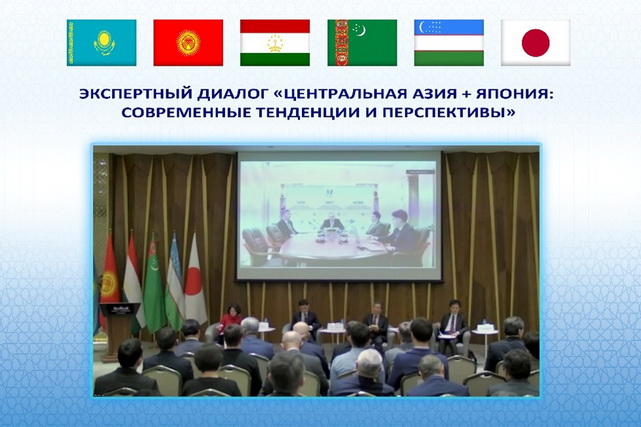
Director of ISRS outlines prospects for cooperation between Central Asia and Japan
Director of ISRS outlines prospects for cooperation between Central Asia and Japan
Tashkent, Uzbekistan (UzDaily.com) — On 6 March, the expert dialogue “Central Asia + Japan: Current Trends and Prospects” took place in Astana.
The event was organized by the Kazakhstan Institute for Strategic Studies under the President of the Republic of Kazakhstan (KazISS) in cooperation with the Embassy of Japan in Kazakhstan and the M. Narikbayev University. It brought together representatives of leading analytical centers and academic circles from Central Asian countries and Japan.
In his speech, Eldor Aripov emphasized that Japan is a reliable and time-tested partner. “It is difficult to overestimate Tokyo’s contribution to ensuring the sustainable and steady development of Central Asia,” he stated.
According to him, since the Central Asian countries gained independence, the volume of Japan’s official assistance to the region has exceeded five billion US dollars. These funds have been allocated to the implementation of socially significant projects, support for economic and administrative reforms, and the integration of the region into global economic relations.
It was noted that the Japan International Cooperation Agency (JICA) has launched several important projects in the fields of healthcare, education, energy, transportation, and telecommunications. As an example, the Director of ISRS highlighted Uzbekistan, where the Uzbek-Japanese Youth Innovation Center and the Uzbek-Japanese Center for Human Resources have been established.
The expert also pointed to the active development of trade and economic relations. He noted that since 2000, Japan’s trade turnover with the region has increased sixfold—from 400 million to 2.4 billion dollars in 2024.
He stressed that the institutionalization of dialogue has played a key role in achieving such high levels of cooperation. Japan was the first country to initiate the “Central Asia + Japan” dialogue at the level of foreign ministers in 2004. This platform has proven to be an effective mechanism for discussing cooperation in various areas. “In essence, Japan set the precedent for the creation of ‘Central Asia Plus’ formats, prompting other partners to follow its example,” the analyst added.
Expressing satisfaction with the results of cooperation, the ISRS representative emphasized the need for its further development. In his opinion, the positive transformations in Central Asia are opening up entirely new prospects for expanding multilateral cooperation.
Referring to the words of the President of Uzbekistan, Aripov quoted: “Today, this is a different Central Asia—united and strong, open to dialogue and full-scale partnership.”
In light of the region’s development priorities, the Director of ISRS proposed several promising areas of cooperation that require joint efforts by the countries of Central Asia and Japan.
First, Eldor Aripov emphasized the growing importance of promoting joint industrial cooperation projects. Central Asia has already established successful cross-border trade and industrial zones, bilateral investment funds, and major industrial initiatives. He paid particular attention to the Action Plan for Industrial Cooperation Development for 2025–2027, approved by the Central Asian leaders in August last year. This document creates new opportunities for cooperation with foreign partners, including Japan.
He described Japan as a global leader in science and technology and a promising partner for introducing innovations in the region. He highlighted the importance of establishing a mechanism for transferring Japan’s experience in high-tech development.
Second, the Director of ISRS pointed out that the growing population of Central Asia, which has increased by 20% over the past 10 years to reach 80 million people, underscores the importance of human capital development. He noted that the region’s young population, with an average age of under 30, presents significant opportunities in the education sector, where Japanese partners can explore new prospects.
Aripov stressed that over 50 branches of foreign universities are already successfully operating in Central Asia, and the region is actively working toward creating a unified educational space. He suggested expanding cooperation with Japan in education, with a focus on training highly qualified specialists.
Third, he identified climate resilience and adaptation to climate change as key priorities. According to him, the region is particularly vulnerable to climate change: over the past 30 years, temperatures have risen by 1.5 degrees Celsius, which is twice the global average.
By 2050, the region could face a 30% water deficit. More than 90% of water resources are used for irrigated agriculture, where water loss exceeds 50%.
In Aripov’s view, Japan can play a significant role in strengthening the region’s resilience to environmental challenges by sharing innovative solutions in the agricultural sector, smart farming technologies, and water resource management.
Fourth, he highlighted the importance of a balanced and consistent green transition for Central Asia. The region, he said, has immense potential for renewable energy.
For instance, Uzbekistan alone has the capacity to produce 500 gigawatts of solar energy, 100 gigawatts of wind energy, and 10 gigawatts of hydropower.
He pointed out that Central Asian countries have adopted a regional “Green Agenda” program aimed at forming unified approaches to the development of clean energy sources. Given Japan’s achievements in this field, the expert sees great potential in strengthening cooperation through the introduction of Japanese energy- and resource-saving technologies.
In his view, the implementation of these initiatives will enhance Central Asia’s resilience, unlock the region’s internal potential, and open up vast opportunities for cooperation with Japan.